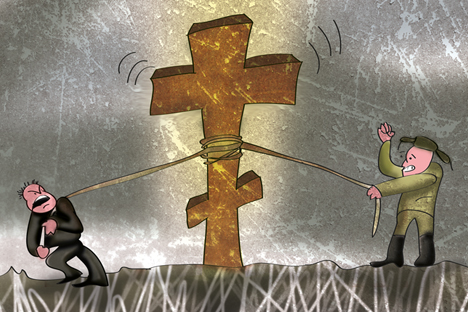
Drawing by Niyaz Karim
The case of Pussy Riot has aggravated both sides of Russia’s religious divide, and fairly evenly at that. Before the incident, the Russian Orthodox Church had, by and large, remained detached from sociopolitical matters. Still, denizens of Moscow’s bohemian scene, who often look down their noses at the country’s main religion, have rarely shied away from baiting the Orthodox Church when it launches an offensive against society.
There are, indeed, tell-tale signs of such an offensive this time: the rights of other denominations are being gradually squeezed; efforts are being made to force Orthodox Christianity into the high school curriculum; shiny new churches are popping up in underdeveloped urban spaces; and who can avoid the ubiquitous Christmas and Easter services, broadcast live by the main, state-owned television channels of this officially secular country?
As a profoundly secular and non-religious citizen, and, moreover, as a politician utterly convinced of the need to defend secularism and equality of all faiths, I am concerned. However, in all fairness, I have to admit that the Church has never interfered excessively in my life, socio-politically or otherwise. What’s more, the Church’s attack on the secular foundations of the state has made little headway. The compulsory teaching of Orthodox Christianity in schools and other intrusive initiatives were successfully fought off. I would hesitate to say that Russia is on the verge of toppling into a theocratic abyss.
Thus, it is all the more strange to see so many Russian intellectuals and middle-class entrepreneurs, accompanied by loiterers who occupy so-called “creative” professions, in spasms of rage over the Church’s stance on the Pussy Riot affair. To be honest, it's also highly irritating — more so than all the other problems caused by the Church combined.
We must remember a few things here. First, the persecution of Pussy Riot is, obviously, not the doing of the Church and its believers, but of the Russian government, which in the past decade has allowed, and even encouraged, the encroachment of religion into our daily lives.
Second, there is the question of the group Pussy Riot itself. I’ll give an example. Nadia Tolokonnikova first emerged on the Russian political scene at the Dissenters’ March on April 14, 2007, accompanied by her publicity-thirsty husband, Petr Verzilov, who leaped from car to car, urging the protesters to attack the riot police. Verzilov was detained and handed over to the police by the protesters themselves. And what did the police do? They refused to arrest him because the “suits upstairs” had forbidden it.
Third, I have learned a lot in recent years from my encounters with the opposition movements of Russia’s liberal intelligentsia; nothing surprises me anymore. Even so, to pour vitriol over the Church for no reason, and in terms that would make a sailor blush, damages (to put it mildly) the reputation not of the Church, but of the liberal intelligentsia itself. And no Madonna in any shape or form will be there to offer salvation.
Fourth, returning to the start of our discussion, the Church does have an image problem. Its leadership lounges in luxury, let’s not deny it, and it has become part of the state bureaucracy, from which it should remain separate. There is also the matter of its onslaught against freedom of conscience and the rights of non-believers and believers of other faiths, which I touched upon above. Indeed, the very nature of faith among Russians who describe themselves as “Orthodox” is often rather perverse. Many of them do not go to church, do not read the Bible, do not know the names of the twelve apostles...
So what? I hear you ask. What do you expect after the tragic decades of the communist experiment, when “scientific atheism” was an academic subject? Well, I guess that's the way it is — forgive me, all you “Orthodox-lite” believers out there.
In many ways it’s not such a bad thing. It means that, after decades of having atheism injected into their veins, people are at last searching for faith on their own terms, without someone prodding them with a stick. It’s an organic process. And that’s good. It means that people are willing to perceive the world through their own eyes, not through the atheistic (or theistic) prism of a textbook. It creates an environment conducive to the communication and discussion of ideas and views.
My years of talking to the average Russian voter have taught me that the Orthodox faith is neither an enemy nor an obstacle on Russia’s path towards Europeanization and democratization. Faith does not have a say in the matter. Many staunch supporters of democracy, including members of my own party, Democratic Choice, are Orthodox Christians.
Religion is a private matter for each individual. And let it remain so. Let's call a ceasefire and take the first steps towards reconciliation. And this also applies to those Orthodox Christians who would gladly have Pussy Riot executed. The mindless hysteria on both sides blurs into one.
But the naysayers and decriers of progressive thinking will always be lurking somewhere in the bushes. What worries me most is the conduct of a section of society on which I always looked upon with hope: the secular, educated intellectuals. Colleagues, put a stop to your anti-Orthodox hysterics. Don’t sow the seed of enmity. This is our country, our society, our people. Let's respect each other. Leave the Church alone.
This article
can be read in the original Russian in Pravoslavie i Mir.
All rights reserved by Rossiyskaya Gazeta.
Subscribe
to our newsletter!
Get the week's best stories straight to your inbox